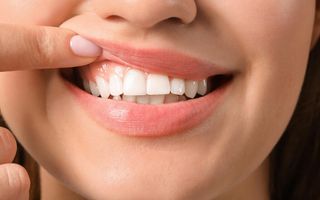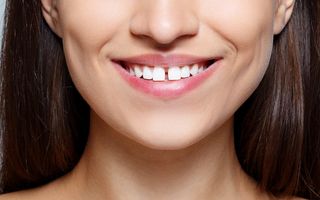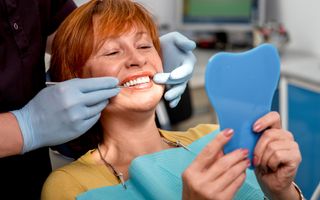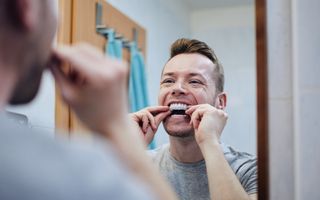
Gingivitis & Periodontal Disease
What is Gingivitis?
Gingivitis is a reversible gum infection caused by bacterial plaque. It is the initial stage of gum disease and has three different stages – mild, moderate and severe.
Bacteria never stops growing on our teeth and after a few hours, it forms a soft, sticky film called plaque. If plaque is not readily and/or effectively removed from the teeth and around the gum line, the gum becomes infected. Unfortunately this infection doesn’t typically produce pain or symptoms that alert people to this infection, so it can easily go undetected. If gingivitis is left untreated, it can destroy the things that support the teeth – the gums and bone – this too is generally painless. Once these things become destroyed, they don’t grow back and this is why home care and excellent plaque control is so important.
The good thing about gingivitis is that it is completely reversible. By removing the plaque that is causing the infection, the gums will heal within a week or two.
Seeing us at Kissing Point Dental Group for a professional cleaning, educating you on where plaque is being left behind and giving you a customised routine for removing plaque with a toothbrush and interdental implements such as floss and/or interdental brushes will help ensure that it does not progress to something more serious.


Signs and Symptoms of Gum Disease
Bleeding Gums
Bleeding gums and loose teeth are signs that you have gum disease and it should not be ignored.
Most people will be affected by bleeding gums when they brush and/or floss at some point in their lives. Often it is mistaken for trauma caused by brushing and/or flossing too hard. Heathy gums should not bleed and teeth that have a healthy support system should not be mobile.
If detected early enough, these symptoms can be treated and any disease can be reversed or stabilised.
Loose Teeth
Your teeth can become loose for many reasons, but the most common is due to gum disease.
Gum disease (gingivitis) is common and can affect the roots of your teeth which are lodged into your bone via their roots. Signs of early gum disease include swelling, soreness, bad breath, infected gums, and bleeding when you brush and floss. It can be reversed, but if gingivitis isn’t treated, the bone in your jaw may become damaged, with small spaces opening up between your gums and teeth. Your teeth can become loose and fall out.
Receding Gums
Receding gums are common problem for people. This issue can cause sensitivity that ranges from mild to severe, food traps and aesthetic issues. Once upon a time we believed receding gums were part of the aging process. However, we now know it related to infection and or trauma.
Gum Recession and Gum Reshaping
An intact gum is a natural defence against both trauma and bacterial penetration. This will often result in sensitivity, poor aesthetics and decay.
Not all gum recession needs to be treated and sometimes the solution is as simple as stopping to brush aggressively and use of a soft bristled toothbrush or an electric toothbrush with a pressure sensor to guide you.
When severe, gum grafting techniques are available to replace the lost gum and reinstate the natural function. A donor site is used to provide the missing gum. Either a thin piece of gum tissue is taken from your hard palate or a small strip is gently moved from an adjacent site. The graft will typically cover the portion of root that is exposed and be a highly predictable outcome.
In some instances, it is not necessary to use your own tissue and other graft materials can be used.
Ideally all graft procedures should be performed by specialist Periodontists. Kissing Point Dental Group refers primarily to Dr Kevin Todes and David Grossberg at the Sydney Periodontist Centre

Sensitive Teeth
Tooth sensitivity is a common dental problem that can affect people in the short and long term. It is typically the result of dentine tubule exposure. A dentine tubule can be compared to a pore in the skin. These pores contain nerve endings which are easily irritated by cold and acidic substances.
Dentine and it’s tubules is typically covered by gum but if the gum recedes through trauma and /or infection, they can become exposed. Active gum infections can also result in sensitivity as it results in the environment under the gum becoming acidic.
Sensitive teeth treatments include desensitizing toothpaste, application of desensitising varnishes in the dental office, restoring ditched out enamel, limiting acid exposure such a soft drinks, gum grafting and patient education to prevent further gum recession and further wearing of the enamel.
Bad Breath
Bad breath or halitosis is a common and embarrassing problem. It is usually related to bacteria coating the tongue, tooth decay and or active gum disease/ infection. For the most part it is a temporary problem that can be easily rectified.
Tips for Better Breath
- Clean your tongue gently with tongue cleaner as directed by the dentist
- Have your teeth cleaned periodically ( 6 months is ideal) by our team.
- Brush and floss your teeth as recommended by Kissing Point Dental. Practice complete oral health and brush behind the back teeth in each row.
- Eat fibrous vegetables, such as carrots and celery. This helps to keep the tongue clean.
- Clean your mouth after eating and drinking proteins, such as milk products, fish and meat. The bacterial coating breaks down protein to produce sulfur.
- Drink plenty of liquids but be aware that drinking too much coffee may make the situation worse.
- Get control over the problem. Ask a family member to tell you whenever you have bad breath.
- Clean your dentures very well with a denture brush and soak overnight in an antiseptic solution as recommended by your dentist.
- If you have a dry mouth your tongue coating will be worse. Post-nasal drip due to allergies or illness will make your breath worse, as continuous protein mucous is broken down by tongue coating and gives off sulfur.
- If odour comes from your nose or stomach and not from your mouth, see a doctor immediately as it may be caused by medical problems.

Gum Abscess
A dental abscess is a collection of pus that can form inside the teeth, in the gums, or in the bone that holds the teeth in place. It’s caused by a bacterial infection. A tooth or gum abscess is called a periodontal abscess.
Symptoms of a tooth or gum abscess
Dental abscesses in your teeth and gum are often painful, but aren’t always. In either case, they should be looked at by the dentist. Getting help as soon as possible is important because gum abscesses don’t go away on their own. They can sometimes spread to other parts of the body and make you ill.
Symptoms of a tooth abscess or gum abscess may include:
- An intense, throbbing pain in the affected tooth or gum that may come on suddenly and gets gradually wore.
- Pain that spreads to your ear, jaw and neck on the same side as the affected tooth or gum.
- Pain that’s worse when lying down, which may disturb your sleep.
- Redness and swelling in your face
- Shiny, red and swollen gums
- Sensitivity to hot or cold food and drink
- Bad breath and/or an unpleasant taste in your mouth
If the infection spreads, you may also develop a high temperature and feel generally unwell. In severe cases, you may find it hard to fully open your mouth and have difficulty swallowing or breathing.
Tooth & gum abscess treatment
Dental abscesses are treated by removing the source of the infection and draining away the pus.
What you can do to help prevent gum disease
Since gum disease is caused by plaque build up, it is vital to carefully but gently remove build-up via regular brushing and flossing.
See your dentist regularly too, for a professional deep clean to remove hardened plaque (tartar), which you can’t do at home
Even if you’re not due for a visit, come and see your dentist if your gums are painful or if your gums bleed when you brush and floss or if you’re concerned.
Your dentist may suggest an x-ray to determine the health and condition of your jawbone and teeth and treatment to help prevent more loose teeth.
If gum disease is severe (periodontitis), you’ll need further treatment perhaps by a specialist in gum problems. And, if you’re at increased risk of developing gum problems (if you’re a smoker or have diabetes, for example), you may be advised to visit your dentist more often to closely monitor your teeth and gums.
Other causes of loose teeth
Pregnancy
Surging levels of pregnancy hormones affect the ligaments and bone around teeth and can cause teeth to loosen in the gums. Thankfully, though, this is likely to be temporary (unless there is underlying gum disease which will need to be treated). It’s vital to get any loose teeth check out by your dentist.
Osteoporosis
This disease is characterised by thin, porous bones and it can affect your jawbone, too. Teeth can become loose if the bones around the teeth lose their density. Both men and women can be affected by osteoporosis, but according to the US National Institute of Health, women affected by osteoporosis are three times more likely to have tooth loss compared with unaffected women.
Come in to see your dentist and talk about ways to protect your teeth. If you are affected by osteoporosis, your GP will be speaking with you about ongoing medication for the condition.
Tooth trauma
Anything that knocks the teeth – such as regular tooth grinding, clenching, and teeth that don’t align properly – can also cause your teeth to become loose. Plus, any trauma to your mouth from sports, a fall or an accident can damage the tooth itself as well as the ligaments and bone around the tooth all causing the tooth to potentially become loose. If you’re involved in an accident or receive a blow to your teeth, contact your dentist immediately. For tooth grinding and alignment problems, your dentist can provide useful techniques and effective treatments to help you retain your teeth.
Important note – it is now widely accepted that untreated periodontal disease is a significant risk factor for heart attacks, strokes and premature child birth.
It is possible to have periodontal disease and have no warning signs. That is one reason why regular dental check-ups and periodontal examinations are very important. Treatment methods depend upon the type of disease and how far the condition has progressed. Professional treatments must always include a customised home care routine and can be as simple as a general professional clean. In more severe cases, it may require deep cleaning in stages with local anaesthetic.
Home care and daily plaque control is one of the most important factors in treating, preventing and stabilising periodontal disease. This is because plaque accumulates at such a rapid rate and without effective removal, gums will reinfect within days. This plaque can also harden and become calculus quite quickly if it is not effectively removed on a daily basis. A team effort between you and Kissing Point Dental Group is essential to achieving and maintaining a healthy mouth.
Periodontal Disease
Periodontitis occurs when gingivitis is left untreated. Eventually the gums separate from the teeth and this causes gum pockets to form. Bacteria then colonise these pockets which over time results in the destruction of the bone and gum. The deeper these pockets are, the harder it is to get the periodontitis under control.
Periodontitis is a severe and irreversible form of gum disease that is characterised by the destruction of the supporting structures of the teeth (the bone and gum). It has three different stages – mild, moderate and severe.
This can easily happen if you are not a regularly see a dental professional as gingivitis and its progression into periodontitis generally doesn’t cause pain. The warning signs people get such as bleeding are often ignored or mistaken for tooth brushing or flossing trauma. Furthermore, it is a common misconception that gum recession is part of the aging process, so this too is often ignored. If periodontitis is not first diagnosed by a dental professional, the patient may become aware that something isn’t right when they notice teeth becoming mobile, moving in position or suffer pain which can be either localised or generalised.
Fortunately it is possible to treat periodontitis and in many cases, it can be stabilised. This means that the destruction of the supporting bone and gum can be halted in its current position. Unfortunately, any bone and gum loss is irreversible as these structures do not grow back.

Signs and symptoms

Gaps & Spaces

Missing Teeth

Crowded Teeth

Discoloured Teeth

Damaged & Worn Teeth
How periodontal (gum) disease effects your whole body
Dentists have long suspected that there is a relationship between gum health and other chronic conditions like heart attacks, strokes, diabetes and osteoporosis.
Gum/periodontal disease is caused by the presence of bacteria accumulating between the gum and the teeth. If fresh young colonies of the bacterial laden plaques are not removed a low-grade infection develops and the gums/gingiva get inflamed. This infection can spread around the body and cause a multitude of other even more significant health issues.
So, in spite of advanced periodontal disease being the number one cause of tooth loss, elimination ideally and prevention of further disease is even much more important than simply keeping your teeth. It may save your life.
Studies have shown there is a strong link between periodontal disease and heart attacks. In gum disease, the bacteria enter the blood stream where they can attach to fatty deposits [plaques] in the blood vessels. This condition can cause blood clots which may lead to a heart attack or a stroke. It may surprise you to know that people with gum disease are twice as likely to suffer from coronary artery disease. In addition the inflammatory response caused by the periodontal disease leads to increased production of the so called “c-reactive protein” which further inflames arteries and has the resulting consequential risks
The relationship between periodontal disease is quite complex. On the one hand diabetics have compromised blood flow to the teeth and gums and this reduced circulation allows bacteria to colonise. In addition, diabetics are more vulnerable to all types of infection including periodontitis. Moderate and severe degrees of diabetes also raise the blood sugar levels meaning the body has to cope with elevated blood sugar levels for longer making it more difficult to control the blood sugar. High sugar/glucose levels in the saliva promote growth of the bacteria that cause gum disease. Compromised blood flow means that the ability of vessels to deliver nutrients and take away waste products further increases the gum‘s susceptibility infection and disease.
It is well documented that smoking is harmful to one’s health but did you know that diabetics aged 45 years and older who smoke, are twenty times more likely to develop periodontitis compared to similar non-smokers.
Hormonal changes that occur during pregnancy result in a much-increased risk of developing gingivitis even in women who don’t ordinarily suffer from gum disease. Unfortunately, this may lead to premature child birth, low weight babies and preeclampsia.
We are increasingly aware of the ramifications of osteoporosis which is the thinning of bone and reduction in its density. Periodontal disease results in bone loss. Research has shown that bacteria in the mouths of women with periodontal disease are much more likely to have bone loss in their mouths and jaws which can lead to tooth loss. Additionally, osteoporosis in post-menopausal women are nearly twice as likely to develop periodontal disease.
Recent evidence has shown a link between periodontal disease and airway conditions such as pneumonia, bronchitis and emphysema. People with low immunity will commonly suffer from both periodontal disease and respiratory problems. This means that the bacteria which grow both above and below the gum line are not challenged by the patient’s immune system. Naturally this disease gets progressively worse and in turn worsens the respiratory issues.
Frequently asked questions
Some factors increase the risk of developing periodontal disease:
- Poor plaque control
- Infrequent calculus removal/professional cleaning
- Genetics – 8-10% of the population are genetically predisposed to periodontitis
- Tobacco smoking or chewing
- Systemic diseases such as diabetes
- Medication such as steroids, some types of anti-epilepsy drugs, cancer therapy drugs, some calcium channel blockers and oral contraceptives
- Bridges/prosthetics that no longer fit properly
- Crooked teeth
- Fillings that have become defective
Several warning signs that can signal a problem:
- Gums that bleed easily
- Red, swollen, tender gums
- Gums that have pulled away from the teeth
- Persistent bad breath or bad taste
- Permanent teeth that are loose or separating
- Any change in the way your teeth fit together when you bite
- Any change in the fit of partial dentures
Gum disease can be treated, but how we treat it depends on the type of gum disease and what stage it is in. One of the most important factors in the success of the treatment of gum disease is patient education and meticulous daily plaque control at home. This is because the bacteria and plaque which causes gum disease never stops growing and the gums can easily reinfect if it is not properly managed.
Before treatment can commence, a diagnoses must first be made. We diagnose the type of gum disease through the appearance of the gums (whether they are red and swollen), if there is bleeding present and the levels of inflammation. We then determine whether there has been permanent damage to the supporting structures through something called a periodontal chart. The gum isn’t directly attached where you see it on the tooth; the gum can lift away from the tooth and this is called a sulcus. When there has been permanent damage to the supporting structures and the sulcus deepens, it is then called a periodontal pocket.
Gums and bone which have not had permanent damage typically have sulcus depths of 1-3mm. These depths can increase slightly if there is significant inflammation of the gum and this causes a false pocket. This resolves once the inflammation clears and measurements return to the normal range. This is called gingivitis and it can be mild, moderate or severe. Once the source of infection (plaque and calculus) is removed and controlled through daily oral hygiene, the gums return to a normal healthy state.
Gums and bone which have encountered permanent damage have pockets which are greater than 4mm. This results from the destruction of the supporting bone. In some cases the gums will stay at their normal level and the bone receeds. In other cases, the gum recedes along with the bone and patients may visually become aware that something isn’t right. This is called periodontal disease. Depending on the level of bone and gum loss, it can be mild, moderate or severe in nature. Bone loss is also assessed through x-rays. Any loss of the supporting tissues such as bone and gum is permanent.
One of the most important factors in treating gingivitis is education. In most cases gingivitis doesn’t cause pain and unless you are dentally trained, it can be hard for people to visually detect. This is why if there is an issue with your home care, we will show you where you are missing plaque and where you have calculus (hardened plaque). We will then educate you on what gingivitis is and how it progresses into periodontal disease. Once you understand how detrimental plaque is, we will demonstrate in your mouth how you should brush, clean in between the teeth and whether you should use any mouth rinses or specialised toothpastes. Every mouth is different, so home care is customised to the individual.
After educating our patients on gingivitis and providing a home care routine, we treat the gingivitis by removing the plaque and calculus from the teeth which is causing the infection. This is done will specialised equipment such as an ultrasonic scaler (uses vibration and water to blast off plaque and calculus), hand scalers and polishing. When the gums are infected and depending of the severity of the infection, this process can be uncomfortable. We don’t like inflicting suffering on our patients, so sometimes this treatment is done using local anaesthetic to numb the gums, so the process is painless.
One of the most important factors in treating periodontal disease is education. In most cases periodontal disease doesn’t cause pain and unless you are dentally trained, it can be hard for people to visually detect. This is why if there is an issue with your home care, we will show you where you are missing plaque and where you have calculus (hardened plaque). We will then educate you on what periodontal disease is. Once you understand how detrimental plaque is, we will demonstrate in your mouth how you should brush, clean in between the teeth and whether you should use any mouth rinses or specialised toothpastes. Every mouth is different, so home care is customised to the individual. When you have suffered permanent damage to the supporting structures of the teeth, meticulous plaque control is paramount. Unfortunately any bone and gum loss is permanent and the goal then becomes to stabilise the gums and bone and prevent further destruction and potential tooth loss. This is not possible if daily home care isn’t meticulous.
Periodontal disease is treated by removing the plaque and calculus from the teeth which is causing the infection. This is done will specialised equipment such as an ultrasonic scaler (uses vibration and water to blast off plaque and calculus), hand scalers and polishing. Because we are having to clean more than 4mm under the gums, this process is typically not comfortable – particularly if the periodontal disease is active and the gums are inflamed. We don’t like inflicting suffering on our patients, so this treatment is usually done over two appointments and using local anaesthetic to numb the gums, so the process is painless. Antibacterial agents are often recommended in conjunction with a customised home care routine. Once the periodontal disease is stable and inflammation is low to resolved, cleaning generally doesn’t require local anaesthetic – even if we are going more than 4mm under the gums as healthy gums typically don’t cause pain during professional cleaning.


